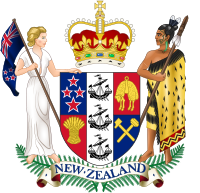Supreme Court of New Zealand
| Supreme Court of New Zealand | |
|---|---|
| Te Kōti Mana Nui (Māori) | |
 |
|
| Established | 1 January 2004 |
| Country | New Zealand |
| Location | 85 Lambton Quay, Wellington |
| Composition method | Appointed by the Governor-General on behalf of Queen Elizabeth II on the advice of the Prime Minister (Chief Justice) and Attorney-General (Justices) |
| Authorized by | Supreme Court Act 2003 |
| Judge term length | Retire at age of 70 years (Judicature Act 1908, s 13) |
| No. of positions | 5 |
| Website | courtsofnz.govt.nz |
| Chief Justice | |
| Currently | The Rt Hon. Dame Sian Elias, GNZM, PC, QC |
| Since | 1 January 2004 |
The Supreme Court of New Zealand (in Māori: Te Kōti Mana Nui) is the highest court and the court of last resort in New Zealand, having formally come into existence on 1 January 2004. The court sat for the first time on 1 July 2004. It replaced the right of appeal to the Judicial Committee of the Privy Council, based in London. It was created with the passing of the Supreme Court Act 2003, on 15 October 2003. At the time, the creation of the Supreme Court and the abolition of appeals to the Privy Council were controversial constitutional changes in New Zealand.
It should not be confused with New Zealand's "old" Supreme Court, which was a superior court that was established in 1841 and continued in 1980 as the High Court of New Zealand. The name was changed in anticipation of the eventual creation of a final court of appeal for New Zealand that would be called the "Supreme Court".
The inaugural bench (with the exception of the Chief Justice, who had automatic appointment) were the most senior judges of the New Zealand Court of Appeal at the time. Their appointment to the new Court was said to have been based on seniority and merit. The maximum bench under statute is six judges.
Several acting Judges have also been appointed to sit whenever a permanent judge was unable to do so due to illness or a conflict of interest. These judges were appointed from the retired judges of the Court of Appeal and including Justices Sir John Henry, Sir Ted Thomas, former President of the Court of Appeal Sir Ivor Richardson and former Chief Justice Sir Thomas Eichelbaum. Acting judges only sit on substantive appeals, and not applications for leave, due to the requirement for appeals to be heard en banc by five judges.
...
Wikipedia
